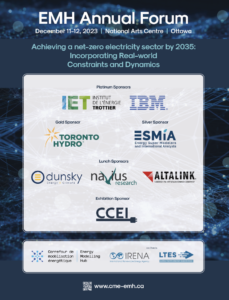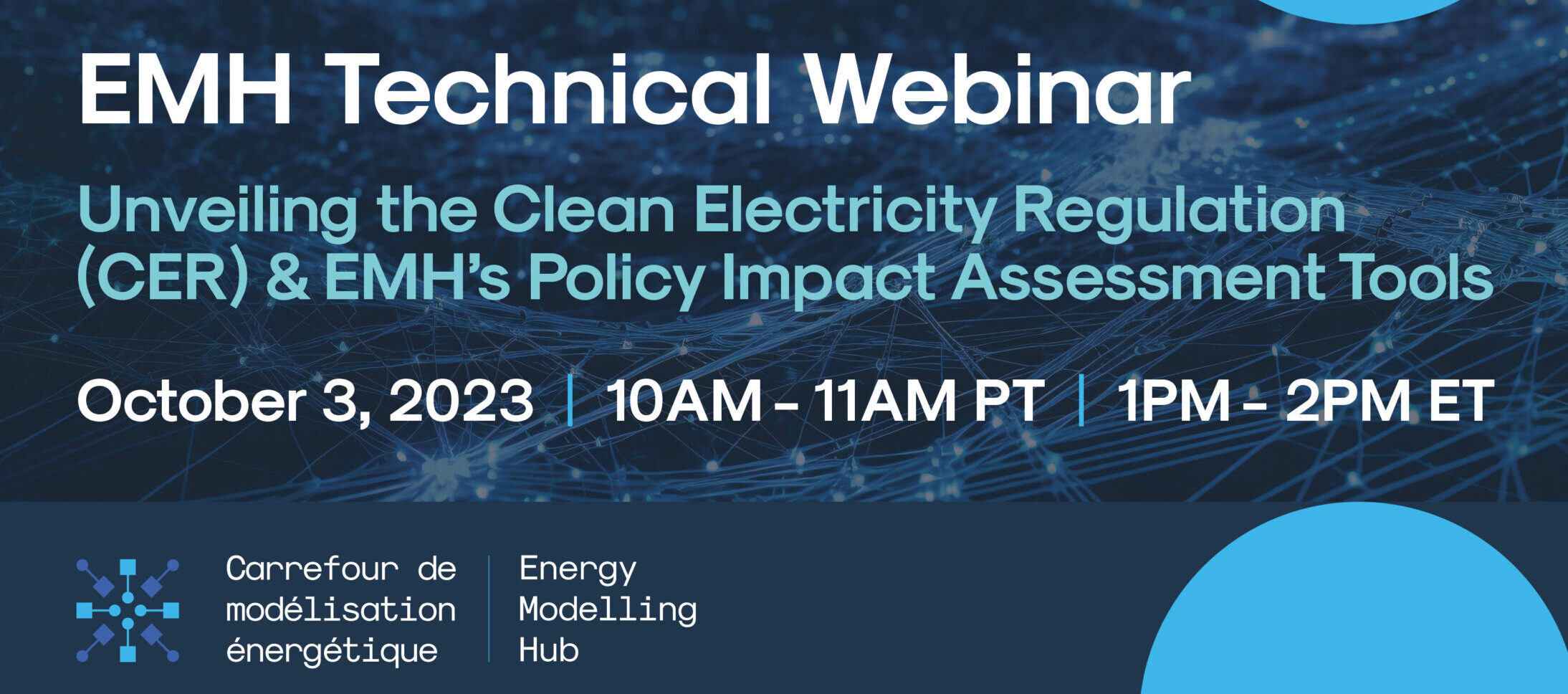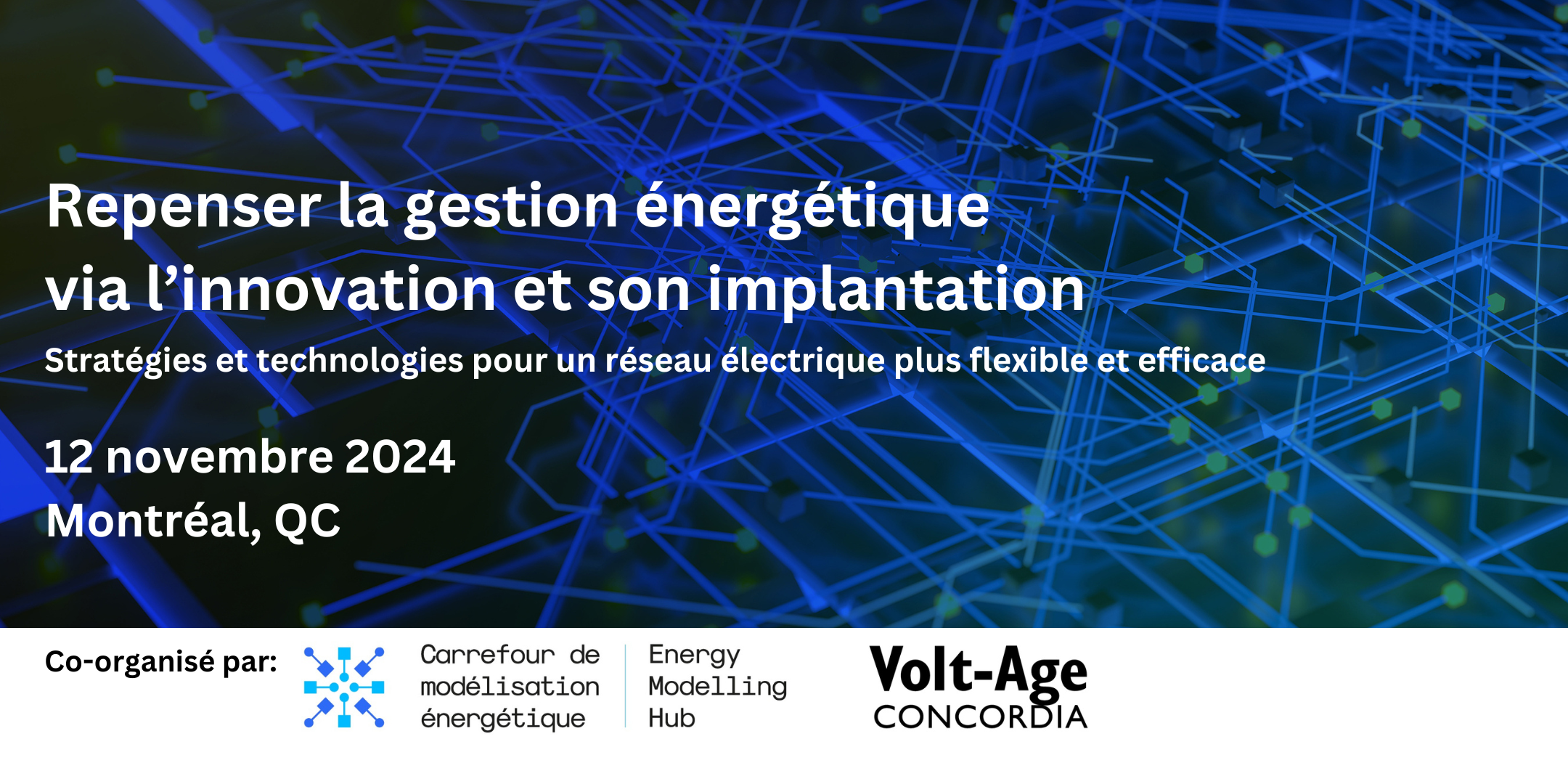Energy Modelling Hub 2023 Annual Forum
“Achieving a net-zero electricity sector by 2035: Incorporating real-world constraints and dynamics.
Last year’s forum delved into both global and Canadian perspectives on transitioning towards a net-zero electricity sector by 2035. The event was part of our collective effort to foster informed dialogues and knowledge exchange, in line with the broader goal of building clean, reliable, and affordable energy systems globally and in Canada.
On December 11, the forum presented an international perspective through IRENA’s Long-term Energy Scenarios (LTES) Network. It featured four panels, presentations, and moderated discussions on a wide range of topics crucial to energy modeling and environmental sustainability. The first day focused on the diverse applications of energy modeling, guiding discussions towards a carbon-neutral framework. Highlights included strategic grid expansion, resilience against supply chain disruptions, and integrating behavioral insights.
The second day, December 12, centered on the Canadian perspective at the EMH Annual Forum. Discussions covered four key areas: the financial implications of CER, labor force modeling, challenges within distribution systems, and mitigating risks in the energy supply chain.
Revisit your favorite session on our YouTube channel.
List of presentations
Session 1: Operationalizing Decarbonization and Grid Expansion through Energy Modelling
Moderator:Julia McNally, Director, Climate action, Toronto Hydro
1.1 Alexandre Prieur, Director, Renewable Energy Integration at CanmetENERGY : Decarbonization and Grid Expansion : An ISGAN perspective
1.2 Conrad Fox, Senior Planner Resource Planning at Independent Electricity System Operator (IESO): Choosing Our Future: Insights and Challenges of Electricity Capacity Expansion Modeling
1.3 Darren Clark, Senior System Planning Engineer at NB Power: NB Power’s 2023 IRP Pathways to a Net-Zero Electricity System
Session 2: Resilience and Adaptation in Energy Modelling
Moderator: Prof. Normand Mousseau, Scientific Director IET & Co-Director EMH
2.1 Scott Barfield-McGinnis, Principal Technical Advisor, North American Electric Reliability Corporation : Evolving Transmission Planning – Modeling for Uncertainties
2.2 Prof. Antoine Rauzy, Norwegian University of Science and Technology : Systemic digital twins: modeling and simulation for strategic decision making
2.3 Antoine Lesage-Landry, Assistant Professor – Polytechnique Montréal : Analyzing and Mitigating Impacts of Grid-edge Technologies on Power Distribution Networks
Session 3: Spotlight I on the Energy Modelling Ecosystem
Moderator: Edouard Clement, Executive Director, Energy Modelling Hub
3.0 Rick Power, Innovation Executive at IBM : IBM in Canada
3.1 Anna Kanduth – Canadian Climate Institute : 440 Megatonnes: Tracking Canada’s Climate Policy Progress
3.2 Natasha Reid – Building Decarbonization Alliance : Introducing the Building Decarbonization Alliance Open Source Model
3.3 Vincent Cote, Managing Consultant Global Energy CoE, IBM : Making Energy Modelling Accessible – The Case of Net Zero Atlantic’s Sustainability Accelerator with IBM
Session 4: Integrating Behavioral Factors in Energy Models
Moderator: Dr. David Foord, Associate professor, University of New Brunswick
4.1 Charlie Wilson, Professor of Energy and Climate Change, and Energy Programme Lead, University of Oxford : Modelling lifestyle change in global energy system models
4.2 Jaih Hunter-Hill, Ph.D. Candidate, Carnegie Mellon University : What Can Energy Consumption Behavior Say about LIHEAP Program Participants?
4.3 Elizaveta Kuznetsova, Lead Energy-Economy Modeller, ESMIA : Empowering individuals: measuring prosumers’ response to energy policies with an intelligent agent-based model
Session 5: Policy Relevance and Decision-making in Energy Modelling: balancing Short-term and Long-term Goals for Policymakers
Moderator: Asami Miketa, Head, Energy Transition Planning, IRENA
5.1 Paul Deane, Senior Lecturer, Clean Energy Futures, University College Cork : Policy Relevance and Decision-making in Energy Modelling: balancing Short-term and Long-term Goals for Policymakers
5.2 Ezzat Jaroudi, Project lead, Environment and Climate Division, City of Toronto : Local Emissions for Net Zero (LENZ) Modelling Suite: A Tool to Guide the City of Toronto’s TransformTO Net Zero Strategy Implementation
5.3 Peter Johnston, Economic Advisor, Integrated Climate Lens Centre of Expertise, ECCC : Modelling for informed decision-making: The Integrated Climate Lens as bridge
5.4 Jean-Denis Charlebois, Chief Economist, Canada Energy Regulator : Energy Modelling at the CER – Policy Relevance & Decision-making
Session 6: Powering the Transition: Modeling the Financial and Systemic Implications of Clean Electricity Regulations
Moderator: Moe Kabbara, Vice-president, The Transition Accelerator
6.0.a Jason Dion, Canada Electricity Advisory Council: Summary and progress update
6.0.b Moe Kabbara, Vice-president, The Transition Accelerator: Modeling the Financial and Systemic Implications of Clean Electricity Regulations
6.1 Mohammed Alkatheri, Energy System Modeller, Net Zero Atlantic : Clean Electricity Regulation for Atlantic Canada
6.2 Douglas Bryan, Project manager, Navius Research : Draft Clean Electricity Regulations modeling analysis
6.3 Anna Cybulsky, Energy System Modeller and Consultant, ESMIA : Cross-sector impacts of the Clean Electricity Regulation (CER): effects on technology buildout, costs, and consumer energy bills
6.4 Jacob Monroe, Research Analyst, EMH & University of Victoria : Applying the COPPER framework to assess the Clean Electricity Regulations
6.5 Brad Griffin, Director of Simon Fraser University’s Canadian Energy and Emissions Data Centre & Aaron Hoyle, Ph.D candidate at Simon Fraser University: Two approaches to modelling Canada’s electricity system transition
6.6 Evan Pivnick, Clean Energy Canada Modelling Clean Energy Canada and the Canadian Climate Institute’s CER recommendations
Session 7: Securing the Energy Supply Chain: Mitigating Risks and Overcoming Constraints
Moderator: Mark Jaccard, Chair and CEO, BC Utilities Commission
7.1 Mark Winfield, Professor, York University : Supply Chains, Energy Transitions and Sustainability
7.2 Abdelrahman Ayad, PhD candidate at McGill University : Securing the Energy Supply Chain: A Real Options Approach
7.3 Francis Bradley, President & Chief Executive Officer, Electricity Canada : Mitigating risks and overcoming constraints
Session 8: Spotlight II on the Energy Modelling Ecosystem Initiatives
Moderator: Edouard Clement, Executive Director, Energy Modelling Hub
8.1 Kristin Loiselle-Lapointe & Emily Taylor King, Canadian Center for Energy Information : Showcasing Recent Enhancements and New Tools on the Canadian Centre for Energy Information
8.2 Jessica Webster, Energy Planning Analyst, NRCan : Testbed-18: Demonstrating Building Energy Data Interoperability Using Open Standards
8.3 Madeleine McPherson, Assistant Professor and PI of the SESIT group, University of Victoria, Co-Director at EMH : The M3 Modelling Platform: Capabilities, Collaborations and Opportunities
Session 9: Powering the Grid: Unraveling Changes, Costs, and Flexibility in Distribution Systems
Moderator: Hanane Dagdougui, Associate professor, Polytechnique Montreal
9.1 Veronique Delisle, Project Manager, Natural Resources Canada Planning for flexibility: The evolution of distributed energy resources integration methods
9.2 Amara Slaymaker, Associate consultant, Dunsky Energy + Climate Advisors : Right Place, Right Time: How holistic, granular, and balanced load forecasting helps utilities target infrastructure investment and prepare for electrification
9.3 Taco Niet, Assistant Professor, Simon Fraser University : Modeling The Sustainable Energy Transition in BC
9.4 Carolyn Calwell, Chief Corporate Services Officer & General Counsel at Ontario Energy Board : Powering the Grid: Unraveling Changes, Costs, and Flexibility in Distribution Systems
Session 10: Empowering the Energy Workforce: Modeling Labor Force Impacts and Future Demands
Moderator: Jacquie Hoornweg, Adjunct professor, Ontario Tech University
10.1 Sheldon Polowin, Economist, Electricity Human Resources Canada : Electricity in Demand: Labour Market Insights
10.2 Sam Harrison, Senior Analyst, Navius Research : Canada’s labour market on the path to net-zero: Results from an improved modeling approach
10.3 Stefan Pauer, Manager, Technology and Economic Analysis, Clean Energy Canada : Canadian energy jobs in a net-zero 2050 future
View the agenda here
Special thanks to our sponsors for their contribution in making this event free for all.
Lunch Sponsors:













